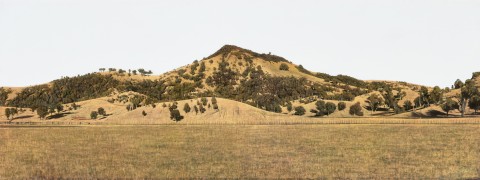HILLSIDE, ELLERSTON, 1990
WILLIAM DELAFIELD COOK
synthetic polymer paint on linen
74.0 x 196.0 cm
signed and dated lower right: Delafield Cook 90
Joseph Brown Gallery, Melbourne, acquired directly from the artist
The Cbus Collection of Australian Art, Melbourne, acquired from the above, December 1990
Dawn to Dusk: Landscapes from the Cbus Collection of Australian Art, Latrobe Regional Gallery, Victoria, 31 May – 16 November 2014
Colour and Movement, Benalla Art Gallery, Victoria, 19 February – 9 June 2016
on long term loan to Wollongong City Gallery, New South Wales
Nainby, B., Stanhope, Z., and Furlonger, K., The Cbus Collection of Australian Art, in association with Latrobe Regional Gallery, Melbourne, 2009, pp. 148
With their glacial proportions and timeless subject matter, Delafield Cook’s Australian landscapes such as the magnificent Hillside, Ellerston, 1990, eloquently encapsulate the concept of time immemorial. For despite their visual immediacy and apparent fidelity, such landscapes nevertheless appear suspended in time – suffused with a sense of calm and tranquillity that, though reassuring in its contemplation of an eternal space, simultaneously evokes a disquieting undercurrent of anxiety and uncertainty through the landscape’s ability to expose our limits and the finitude of our existence.1 The span of a human life pales into insignificance in the face of such an ancient, monumental formation; and indeed, as the artist admits, part of his motivation for fastidiously recording a place springs from ‘acknowledging your mortality’ and ‘attempting to leave something behind after you are gone.’2 Heightening the depiction of reality to such unimaginable degree to reveal the ‘essence’ of his subjects, thus Delafield Cook highlights the surreal within the real, inviting us to contemplate that which lies beyond our perception – the basic human quest for an underlying universal truth that transcends time or locality.
Both Delafield Cook’s affinity for the Australian landscape and his consummate skill in capturing its essential character with an intensity that is unparalleled in Australian art is all the more remarkable when one considers that such paintings – which he created almost exclusively from the late 1970s onwards – were produced entirely from his studio in London. Relocating to London in 1958 after what had been intended as a short trip became a second home, significantly Delafield Cook would spend part of every year for the last three decades of his life travelling back to his country of origin to reconnect and undertake long journeys into the landscape, before then returning to his studio abroad to recreate his vision. Paradoxically perhaps, such distance only enhanced the power of his iconic landscapes, allowing the artist to pursue ‘…the pure idea of land filtered through memory, in which all voices and activities are silenced, and the spirit of the earth can peacefully emerge.’3
An intriguing, mysterious image, Hillside, Elllerston offers a recreation of the eponymous landscape in the upper Hunter Valley region of New South Wales that is so utterly still and elemental, it seems beyond time. Notwithstanding its ostensible neutrality or stark emptiness, the landscape is informed by exquisitely rendered incidents while the vast amplitude of the hillside is conveyed through the painting’s panoramic scale; as Delafield Cook suggests, ‘…it brings in this element of having to turn your head to take in the picture which fills the field of vision, like being there.’4 Simultaneously infinite in its detail and infinite in its expanse, the work thus fathoms an Australian ‘sublime’ that is boundless and majestic in the manner of David Casper Friedrich and the eighteenth-century Romantics Delafield Cook so admired. Inspiring awe and reverence, the classical harmony and stillness imply that the forces of the cosmos have here aligned – that there is a divine order amidst the chaos of nature.5 Bereft of any apparent narrative, it is the landscape itself, distilled in its unknowable ‘essence’, that occupies the focus, imbued with a sense of drama that leaves the viewer poised indefinitely in a moment of suspense. As Delafield Cook observes of this quality in his art, ‘It’s the stage that we’re living out our lives in… The picture is the set, pregnant with possibilities’.6
1. Fitzpatrick, A., ‘Intimations of Mortality in the Work of William Delafield Cook’ in William Delafield Cook. A Survey, Gippsland Art Gallery, Sale, 2011, pp.32 – 44, p.39
2. The artist, cited in Hart, D., William Delafeld Cook, Craftsman House, Sydney, 1998 p. 184
3. Gregg, S., ‘William Delafield Cook: A Survey’, in William Delafield Cook. A Survey, Gippsland Art Gallery, Sale, 2011, pp. 2 – 23, p.5
4. The artist, cited in Hart, op. cit., p. 199
5. Gregg, op. cit., p.9
6. The artist, cited ibid. p.16
VERONICA ANGELATOS
